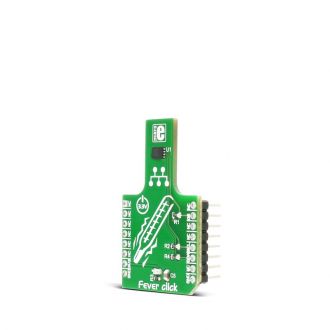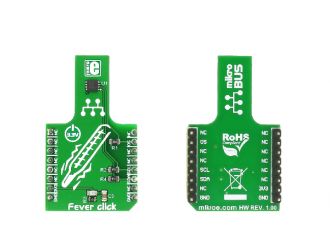
We strongly encourage users to use Package manager for sharing their code on Libstock website, because it boosts your efficiency and leaves the end user with no room for error. [more info]

Rating:
Author: MIKROE
Last Updated: 2018-03-19
Package Version: 1.0.0.1
mikroSDK Library: 1.0.0.0
Category: Temperature & humidity
Downloaded: 8007 times
Not followed.
License: MIT license
Fever click measures your body temperature with the accuracy of 0.1°C (37°C to 39°C). The click carries MAX30205 human body temperature sensor. Fever click is designed to work on a 3.3V power supply. It communicates with the target MCU over I2C interface.
Do you want to subscribe in order to receive notifications regarding "Fever click" changes.
Do you want to unsubscribe in order to stop receiving notifications regarding "Fever click" changes.
Do you want to report abuse regarding "Fever click".


Library Description
Key functions :
void fever_writeReg(uint8_t regAdd, uint8_t regVal); - Generic function for writing to registers.
uint16_t fever_readReg(uint8_t regAdd); - Generic function for reading from registers.
float fever_getTemperature(); - Returns temperature value in Celsius.
Example description
void applicationTask()
{
temperature = fever_getTemperature();
FloatToStr(temperature, text);
mikrobus_logWrite("Current Temperature :",_LOG_TEXT);
mikrobus_logWrite(text, _LOG_TEXT);
mikrobus_logWrite(" C", _LOG_LINE);
Delay_ms(1000);
}
The full application code, and ready to use projects can be found on our LibStock page.
Other mikroE Libraries used in the example:
Conversions
Depending on the development board you are using, you may need USB UART click, USB UART 2 click or RS232 click to connect to your PC, for development systems with no UART to USB interface available on the board. The terminal available in all MikroElektronika compilers, or any other terminal application of your choice, can be used to read the message.